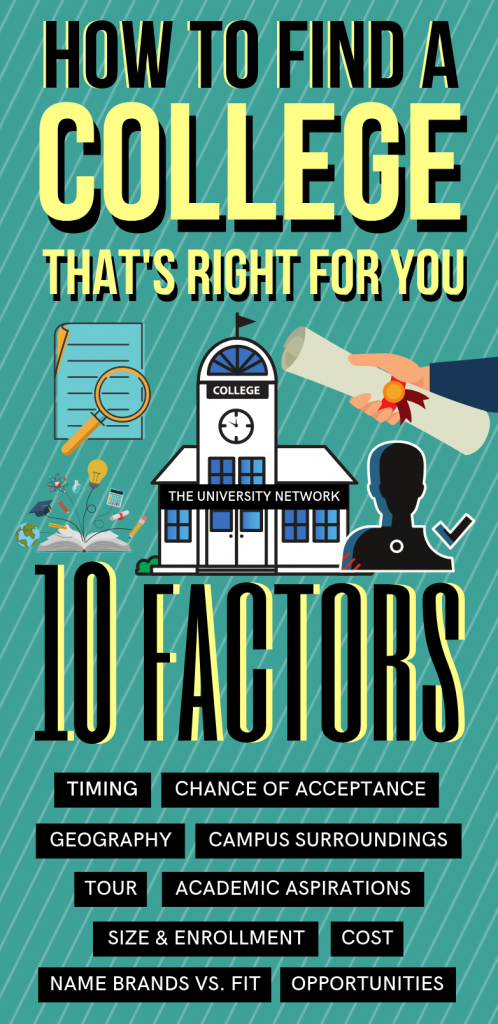It would be a lie to say there aren’t times when the college search is stressful and anxiety-inducing. But, more often, it should be exciting and liberating.
If you’re a traditional student, the college search is your first step into freedom. Searching for colleges gives you the opportunity to take a thrilling glimpse into what could be the next stage of your life.
But, choosing the right school isn’t always easy. There are many factors that you have to consider before deciding where to enroll.
So, to help you through the college search, The University Network (TUN) spoke with an expert and conducted extensive research.
Here are 10 tips to help you find a college that’s the right fit for you.

1. When should you start the college search?
It is never too early to begin the college search, but you should absolutely start before your junior year of high school. Where you attend college is a big decision, and you shouldn’t rush it. The things you learn and the people you meet in college will forever influence who you are.
It’s not necessary to take university-run tours in eighth or ninth grade — you can save that for after sophomore year — but, you should be thinking about where you may be interested in attending.
Talk to your older siblings or cousins about their college experiences. Or, take a weekend trip with your family to a near-by college town. Try to get a feel for what type of school you would like to attend. Consider things like: Would you prefer a big school or small school? Are you happiest in a city or in the country?
2. Do you have a chance of acceptance?
This is clearly the most discouraging part of the college search, but you shouldn’t waste your time, money, or effort on applying to a school that you don’t have an honest chance of being admitted to.
If you have any interest in attending a specific college, take a look at that school’s criteria for admissions — things like the average test scores and GPA of students admitted — and ask yourself, “will the school accept me?,” said Joe Korfmacher, a director of counseling at Collegewise, the nation’s largest college counseling organization.
Early on in your college decision process you should categorize the colleges you are most interested in attending in three sections: “safety,” “match,” and “stretch.”
List a college as a “safety” school if you exceed its typical criteria for admissions. List a college as a “match” school if your grades and test scores fall close to the 50th percentile of those admitted. And list a college as a “stretch” school if you still fall within the college’s criteria for admissions, but you’re towards the bottom.
3. Consider geography
When deciding where you want to go to college, you are choosing where you want to live for the next portion of your life. So, it’s very important to consider “geography,” Korfmacher explained.
If you are able to afford an out-of-state college, you should consider which parts of the country you know, which parts you have family in, and where you are comfortable exploring, Korfmacher continued.
“Maybe you’re someone who lives in the East Coast but has family in Southern California; you should look at some schools out there,” Korfmacher said. And if you like snow and snowboarding, maybe consider schools in Vermont or Colorado.
For those who are more adventurous, you can venture abroad. You can apply to foreign universities directly. Additionally, some U.S. schools, such as Marist University, grant students the possibility to study abroad for four years.
4. Consider campus surroundings and communities
Even in your home state, colleges can have drastically different settings and cultures. So, when choosing your college, you should self-reflect and pick the one that is best fit for, specifically, you.
Say, for example, you’re from the state of Georgia. If you decide to attend Georgia State University, you will be living in the bustling city of Atlanta, but if you choose Georgia Southern University, you will be living in the small south-eastern town of Statesboro, Georgia.
And if you have the financial means to leave the state, the same rules apply. You just have many more options.
“Going to NYU, right in the middle of the country’s biggest city, will be a very different experience than if you went to, say, Villanova, which is 20 minutes outside of a really big city in Philadelphia, but it is very much a suburban campus,” said Korfmacher. “And those two are very different than, say, Miami University of Ohio, which is in Oxford. You drive an hour through corn fields, and once you get there it is a great, beautiful campus, but your life is on campus there.”
Additionally, it is important to find a college with a culture that matches your interests. For example, if you are a huge fan of college athletics and enjoy tailgating and going to live sporting events, you may consider attending a school that prioritizes athletics, such as Penn State, Ohio State University or the University of Alabama. Or, if you are very interested in seeing or playing live music, maybe it is best to seek out schools with an impressive orchestra or a local music scene.
5. Tour effectively
The best way to gauge the culture of a school is by touring it.
There are two categories of touring, Korfmacher suggested. The first he considers to be “test-driving” a college.
“Early in the process, there may be schools nearby (your house), or maybe if you’re on vacation you could stop by and dip your toes in the water — see if it is a school that you’re interested in,” Korfmacher said.
Once you’ve narrowed down your college list by “test-driving” schools, it’s time to get more serious and sign up for official college tours. On these tours, either a current student or an admissions officer will show you the best parts of campus and the nicest dorm, Korfmacher said.
But you shouldn’t stop there.
“I think it is important, either before or after the tour, to get a campus map and walk around by yourself and look around and see everything,” Korfmacher said. If you can, check out some of the classrooms and the dining hall(s). This way you can really get a grasp on what it would be like to be a student at that school.
Korfmacher also suggests that you should picture yourself later in your college career when you are living off-campus. Ask yourself, “if I’m here on a weekend, what do I want to be doing?”
And lastly, if you have already an idea of what you want to pursue academically, Korfmacher suggests trying to set up a time to speak with a professor or two in your desired field. In some cases, touring students will even have the opportunity to sit in on a class.
6. Consider what you want to study
Just to be clear, you don’t need to go into college with an idea of what you want to major in. Plenty of students start college undecided.
However, your academic aspirations should play a role in your decision on where to attend.
If you are dead-set on engineering, for example, it’s advisable for you to prioritize colleges that specialize in engineering and technology. In contrast, if you aspire to earn your degree in English, attending a tech school may not be in your best interest. Instead, you might consider a liberal arts schools where they specialize in humanities-based education.
And if you anticipate going into college undecided — as many students do — “you want to be at a school where you have a lot of options that you can explore,” Korfmacher said.
7. Consider size and enrollment
When it comes to choosing your college, you should absolutely consider size. Colleges range in enrollment from less than 200 students to upwards of 68,000 students. And the number of students a college enrolls can have a huge influence on its academic and social culture.
Academically, large colleges often offer a wide range of majors. However, students who choose to attend big schools will likely have to spend their first semester or year taking classes in huge lecture halls with hundreds of other students, said Korfmacher. This can make it difficult for students to speak up in class or arrange a time to meet with their professor.
At a smaller or medium-sized college, however, students may start their freshman year taking classes with fewer students than they did in high school. So, if you’re someone who learns best in intimate classroom settings where you can actively converse and meet with your professors and peers, a smaller school may be best for you.
Socially, at large schools, it’s easier to remain relatively anonymous to most people on campus, and just be someone in the crowd. At smaller schools, however, faces start to seem familiar really quickly. By the time you graduate, there is a good chance you’ll know, or at least recognize, most people in your graduating class.
8. Consider cost
Cost, for many students, plays a huge role in deciding where to go to college. But, it shouldn’t affect where you apply to, according to Korfmacher.
“What I tell students is, from the beginning, when you just start searching don’t look at that price tag, because they are going to be very scary and very large,” said Korfmacher. “You don’t want to look at that. You want to look and see what school will match you, which will be a good fit.”
However, once the time comes to make a decision, absolutely consider the cost.
Before May 1, when you have received all of the information about acceptance, financial aid reports, and scholarships, it’s very important to sit down with your parents or guardians and have a conversation about which school will be the best social, academic and financial fit, said Korfmacher.
Two schools could be very similar academically and socially, but one school could end up costing you $30,000 more, which you will have to pay back after graduation. If you could see yourself happy at both schools, it is “100-percent advisable” to go to choose the cheaper option, said Korfmacher.
To compare admissions criteria, college costs, and even prospective earnings after graduation, check out TUN’s university comparison tool!
9. Don’t get stuck on name brands
When making your college decision, don’t get stuck on name brand colleges or the schools your high school friends are going to. There are over 2,000 four-year colleges in the United States to choose from. While some may not have existed for hundreds of years or be the best at marketing themselves, that doesn’t mean you shouldn’t consider them.
Your college experience is what you make it. Instead of attending a school for its name or history, choose the college that is the best academic, social, and financial fit for you.
10. Seek out opportunities to learn about colleges
You may have learned about certain colleges through your high school counselor, by watching their athletic teams on TV, or through a personal connection. But there are so many different colleges, and your perfect fit may still be out there waiting to be discovered.
To find the right school for you, consider attending your community’s college fair. There you can learn about schools that you haven’t heard of, and ask any questions you may have to representatives from those colleges.
Additionally, when college representatives come to your high school, make sure you take advantage of the opportunity to meet and talk with them. This way, you can learn more about a college you’re interested in and develop a relationship with a person that is connected to admissions at that school.



